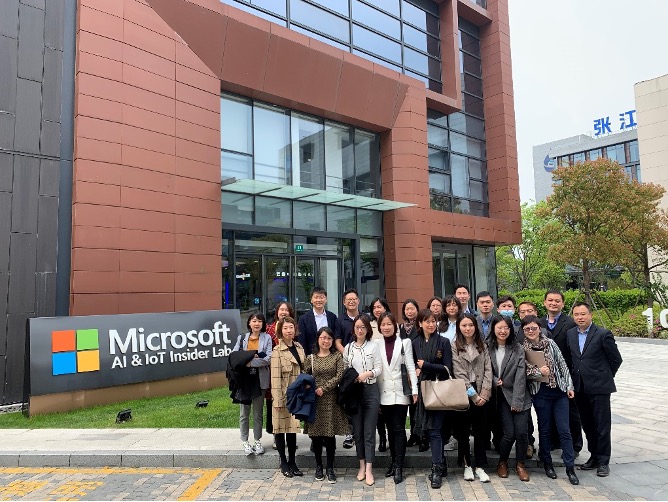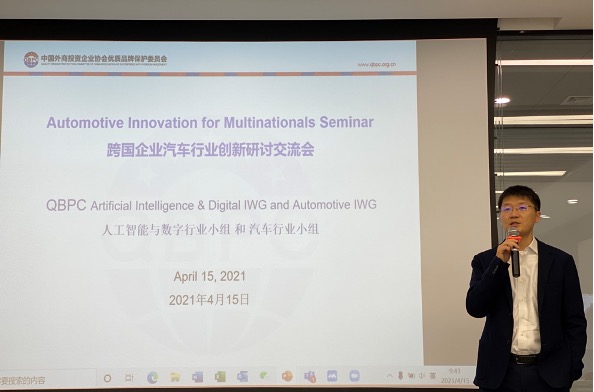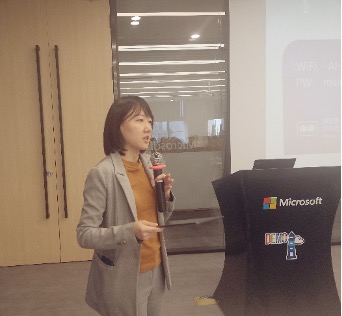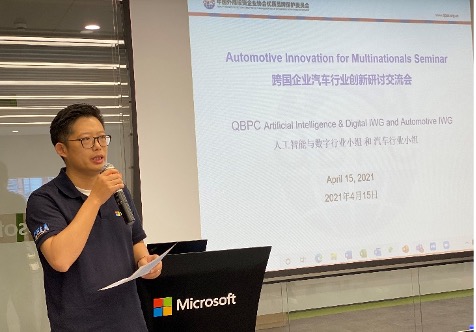WANG Yue
On April 15, the Artificial Intelligence & Digital IWG and the Automotive IWG jointly organized a seminar on innovation in the automotive industry for multinational companies at the Microsoft AI and IoT Lab in Shanghai. The seminar focused on the theme of Artificial Intelligence, Digital Transformation and Cybercrime. Nearly 70 members from the AI & Digital IWG, Automotive IWG and some members of other IWGs participated in the meeting online or offline.


Michael DING
The seminar consisted of two sessions. Firstly, offline attendees visited the AI and IoT labs to understand and experience the wide range of applications of AI in the automotive industry. Next, the invited industry experts, university professors and attendees had an in-depth exchange on the technical and commercial thoughts on cutting-edge AI technologies and digital transformation in the automotive industry, as well as legal thoughts and responses on innovation and digital crime in the automotive industry.

Carol LIU
QBPC Membership Services Committee Vice Chair Carol Lin hosted the meeting. AI &Digital IWG coordinator Tao Yang opened the seminar by introduction that the seminar would focus on AI and digital from technical, business and legal perspectives. QBPC Chair Michael Ding gave a keynote speech to thank the two IWGs for organizing this meeting, which provided a unique opportunity to learn about cutting-edge technologies and applications, and helped members explore how to use AI technology in their business operations and daily work.
Cutting-edge Technology of AI, Technology of Automotive Industry Transformation, and Relevant Business Thinking
Michelle Lei, Business AI Engineering Director of Microsoft Software Technology Center (Asia), introduced the AI applications and solutions for the automotive industry. Michelle pointed out that the scale of AI models had shown an explosive growth with the continuous development of data scale and computing power in recent years. Michelle also shared Microsoft's groundbreaking innovations in AI research, product development and industry solutions. And she introduced how to work with the automotive and manufacturing industries to build data+AI core capabilities platforms and solutions which would help companies to deeply explore the value of data, improve customer experience and optimize the efficiency of product development and risk control. Jordan Dong, Director of Product and Marketing at Microsoft, spoke about Microsoft's data and information protection strategy and how Microsoft 365 provided compliance solutions and technical support for legal professionals to strengthen information security. Next, Peng Zhang, Director of Automotive Industry Solutions at Microsoft China, shared his practice and outlook for the automotive industry. The technology-driven digital transformation of the industry encompassed modern working models, business applications, applications and infrastructure, and data and artificial intelligence. The transformation bridged the gap between data and intelligence in the process. He also talked about the business drivers, areas of focus and business value of digital transformation in the automotive industry as well as the application of key scenarios and solutions in the automotive industry.
On the commercial aspect of combining artificial intelligence with the automotive industry, Xiong Xiaoshuai, General Manager of the Security Consulting Division of Com&Lan Kunlun Technology Development Company Limited, analyzed the security compliance challenges and practices in the digital transformation of the automotive industry. Xiao Yunwei, Capgemini Senior Cloud Solution Architect, MCT, gave a detailed introduction on autonomous driving and Microsoft IoT. Yungoal General Manager Hao Junsheng elaborated on big data analytics in the automotive industry; Marshal Jiang, Director of Public Cloud Security Business at Shanghai Lianwei PanCloud Technology Group shared his views on the topic of Digital Transformation & Security Challenges of an International Auto Company.
Legal Reflections and Responses on Automotive Innovation and Cybercrime
Professor Jiang Su, the Deputy Director of the Legal Artificial Intelligence Laboratory/Research Center and the Criminal Rule of Law Research Center of Peking University, analyzed and explained the legal issues regarding autonomous driving. The three major trends in the current automotive industry are electrification, sharing and intelligence. As one of the biggest application scenarios of artificial intelligence, self-driving has advantages such as safety, efficiency and economy compared to traditional driving. However, the development of self-driving vehicles required several conditions, including technological innovation, infrastructure, legal and policy environment, capital investment and consumer acceptance. Professor Jiang highlighted the latest policies and legal guidelines on self-driving in China. He also analyzed the legal challenges which were road traffic safety, civil liability, privacy and data protection, and cyber security.
Next, Wu Shenkuo, Executive Director of the International Centre for Network Rule of Law at Beijing Normal University and Deputy Director of the Research Centre of the Internet Society of China, shared his thoughts on data compliance and risk control construction in the automotive industry. Professor Wu mainly explained the automotive industry and the data governance situation, China's policy and strategic requirements on data security and data privacy, and the legal and regulatory system. Finally, Professor Wu provided four suggestions on the construction of an internal personal information protection system, including the change of protection mindset, the setting of risk control strategies, the maintenance of core rights and interests, and the control of key risks.
Microsoft Digital Security Senior Analyst Eric Zhou's presentation was about cyber security response to innovation in the automotive industry - preventing cyberattacks in IoT. With the widespread penetration of IoT in various industries, security and privacy issues were drawing increasing concerns. To address the potential security challenges of IoT devices, end-to-end IoT security required professional technical capabilities for full protection, as exemplified by Microsoft Azure IoT security features.

Yang TAO
At the end of the session, Director of Microsoft Government Affairs East China Yang Ning thanked all the speakers and attendees. In his concluding remarks on behalf of the QBPC AI &Digital IWG and the Automotive IWG, Yang Tao looked forward to continuing exchanges and discussion with more QBPC members from different IWGs on AI applications and innovations in the future.
